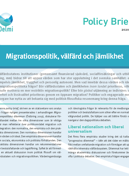Unemployment and poverty rates are significantly higher among immigrants than the native-born population, causing negative consequences and dependence on welfare for the immigrants affected as well as society at large. Empirical evidence from various countries suggest that welfare states can lose popular support if their programs are perceived to mainly benefit immigrants. This policy brief addresses the following questions: Does unemployment among immigrants harm majority support for the Swedish welfare state? How does contact with immigrants in neighborhoods and at workplaces affect attitudes toward government spending among native-born Swedes?
Some conclusions and recommendations
- The new policy brief from Delmi provides additional support for the frequently voiced concern that lacking economic integration among immigrants can be detrimental to native majority citizens’ solidarity with immigrants in need of government assistance.
- The level of immigrant unemployment that natives observe in their neighborhood ties together with opposition to government spending on immigrants.
- It could not be found any statistical evidence that sharing one’s workplace with immigrants affected one’s attitudes toward government spending on immigrants.
- Policies that work toward lowering barriers to labor market entry for immigrants not only have the obvious potential to break the link between immigrant status and poverty, but also to enhance natives’ solidarity with immigrants as well as maintaining public support for the Swedish welfare state.
] The policy brief is written by Tina Goldschmidt, Ph.D. in Sociology at Stockholm University, currently affiliated with the Department of Sociology at Umeå University. The policy brief is based on Goldschmidt’s dissertation Immigration, Social Cohesion, and the Welfare State: Studies on Ethnic Diversity in Germany and Sweden.
Picture by Magnus Östberg from Unsplash.

